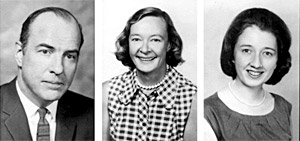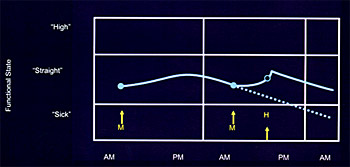The First Pharmacological Treatment for Narcotic Addiction: Methadone Maintenance

Dole, Vincent; Nyswander, Marie; Kreek, Mary Jeanne.
Heroin abuse surged in the United States in the early 1960s, becoming a major public health problem. At the time, most people attributed addiction to a lack of willpower, or to antisocial or criminal behavior. The urgency of dealing with these issues came to the attention of Rockefeller researcher Vincent P. Dole (1913-2006) in 1962, when he was acting chairman of the Health Research Council of the City of New York's committee on unresolved health problems, which was grappling with the heroin problem in New York. Dole proposed that addiction was an illness, a "metabolic" disease with behavioral manifestations. He was so committed to understanding this problem that he changed the focus of his laboratory, where he had studied obesity and metabolism, to heroin addiction and new pharmacological approaches for chronic treatment.
In late 1963 Dole recruited two additional researchers to the project: clinical investigator Mary Jeanne Kreek and psychiatrist Marie Nyswander (1919-1986). In early 1964, this team began studies with heroin addicts at the Rockefeller Hospital which, within six months, established the mode of action and potential effectiveness for maintenance treatment of methadone, a synthetic drug that had been used for short-term detoxification in a few clinics. The researchers also contrasted methadone's effects to the action of short-acting opiates such as heroin and morphine.
These early studies determined that methadone is long-acting in humans, relieves the addicts' craving for heroin, and prevents withdrawal symptoms. In addition, methadone itself does not produce euphoria, and through the mechanism of cross-tolerance, it prevents addicts from feeling any "high" from an injection of heroin—a phenomenon the team called "narcotic blockade." The former heroin addicts needed to take one oral daily maintenance dose which allowed them to function normally. In 1965, translational studies of methadone maintenance treatment involving additional patients were conducted by Nyswander at what was then Manhattan General Hospital.
Early in the research, in 1964, Kreek planned and initiated long-term prospective studies of the physiological effects and medical safety of methadone maintenance. This work was central to the approval in 1973 by the FDA of methadone for the long-term pharmacotherapy for opiate addiction. In parallel with colleagues at Cornell, Kreek also developed the first analytical technique for measuring methadone and other opioids in blood, other fluids, and tissues, which led to the documentation of the unique long-acting properties of this medication. Despite continuing public controversy over the nature of drug addiction, methadone maintenance remains the most effective therapy for managing heroin and other opiate addiction and today is provided to about one million people worldwide.
Vincent P. Dole received the AB in mathematics from Stanford University (1934), and the MD from Harvard Medical School (1939). In 1941, after an internship at Massachusetts General Hospital, he joined the Rockefeller Institute as an assistant in the laboratory of Donald D. Van Slyke. During World War II he joined the Naval Medical Research Unit of the Rockefeller Institute Hospital. After a brief appointment at Harvard University Medical School, he returned to Rockefeller in 1947, and was appointed full member (professor) in 1952. The first annual award of the National Drug Abuse Conference was presented to Dole and Nyswander in 1978, and the Nyswander-Dole Award was created in 1982 by the New York Urban Coalition, the New York State Division of Substance Abuse Services, and the Committee of Methadone Program Administrators. Among many awards and honorary degrees recognizing his work, Dole received the Gairdner Foundation International Award (1972) and the Lasker Award (1988). He was an elected member of the U.S. National Academy of Sciences (1972).

Stabilization of patient in state of normal function by blockade treatment. From Arch Intern Med, 1966, 118: 304
Mary Jeanne Kreek received the BA from Wellesley College (1958) and the MD from Columbia University College of Physicians and Surgeons (1962). During her residency at Cornell University Medical College, she was appointed guest investigator at The Rockefeller University from 1964 to 1967. She became assistant professor at Rockefeller in 1967, head of her own laboratory in 1974, and was named professor in 1994. She is currently Senior Attending Physician and Patrick E. and Beatrice M. Haggerty Professor. In addition, since 1987 she has been Principal Investigator and Scientific Director of a P-60 Research Center established at Rockefeller University in 1987 by the National Institute on Drug Abuse, a component of the National Institutes of Health. Kreek's achievements have been recognized with many awards and honors, including honorary degrees from the University of Uppsala (2000) and Tel Aviv University (2007), the Betty Ford Award (1996), the Special Recognition Award for Research in the Science of Addiction from the Executive Office of the President (1998), the Nathan B. Eddy Memorial Award for LIfetime Excellence in Drug Abuse Research (1999), the R. Brinkley Smithers Distinguished Scientist Award (1999), the Marian Fischman Award of the College of Problems and Drug Dependence (2003), and the Gold Medal for Distinguished Achievements in Academic Medicine of the Columbia University College of Physicians and Surgeons Alumni Association (2004).
Marie Nyswander graduated from Sarah Lawrence College (1941) and received the MD from Cornell University Medical School (1944). After completing her surgical internship she joined the U.S. Navy in 1945 and was posted to the Lexington Narcotic Hospital of the U.S. Public Health Service. She then did a residency in psychiatry at New York Medical College under Lewis Wolberg. In 1950 she established her own practice, and in 1955 helped launch an outpatient program, the Narcotic Addiction Research Project, in New York City. The next year she published The Drug Addict as Patient (1956). Nyswander was adjunct professor at The Rockefeller University from 1964 to 1986.
Selected Publications
Dole VP and Nyswander M. A medical treatment for diacetylmorphine (heroin) addiction. A clinical trial with methadone hydrochloride. JAMA, 1965, 193: 646-650
Dole VP, Nyswander ME, and Kreek MJ. Narcotic blockade: A medical technique for stopping heroin use by addicts. Trans Assoc Am Phys, 1966, 79: 122-136
Dole VP, Nyswander ME, and Kreek MJ. Narcotic blockade. Arch Intern Med, 1966, 118: 304-309
Dole VP, Nyswander ME, and Warner A. Successful treatment of 750 criminal addicts. JAMA, 1968, 206: 2708-2711
Dole VP. Methadone maintenance treatment for 25,000 addicts. JAMA, 1971, 215: 1131-1134
Kreek MJ, Dodes L, Kane S, Knobler J, and Martin R. Long-term methadone maintenance therapy: Effects on liver function. Ann Intern Med, 1972, 77: 598-602
Kreek MJ. Medical safety and side effects of methadone in tolerant individuals. JAMA, 1973, 223: 665-668
Kreek MJ. Plasma and urine levels of methadone: Comparison following four medication forms used in chronic maintenance treatment. New York State J Med, 1973, 73:
Dole VP and Kreek MJ. Methadone plasma level: Sustained by a reservoir of drug in tissue. Proc Natl Acad Sci USA, 1973, 70: 10
http://www.pnas.org/content/70/1/10.full.pdf+html
Dole VP. Implications of methadone maintenance for theories of narcotic addiction. JAMA, 1988, 260: 3025-3029
Novick DM, RIchman BL, Friedman JM, Friedman JE, Fried C, Wilson JP, Townley A, and Kreek MJ. The medical status of methadone maintenance patients in treatment for 11-18 years. Drug Alcohol Depend, 1993, 33: 235-245
Further Reading
Kreek MJ. Methadone-related opioid agonist pharmacotherapy for heroin addiction: History, recent molecular and neurochemical research and the future in mainstream medicine. Ann NY Acad Sci, 2000, 909: 186-216
Nyswander M. The Drug Addict as a Patient. New York: Grune & Stratton, 1956
Oransky I. Vincent Dole. Lancet, 2006, 368(9540): 984
Links
Vincent P. Dole obituary
http://www.nytimes.com/2006/08/03/nyregion/03dole.html
Albert Lasker Clinical Medical Research Award, 1988
http://www.laskerfoundation.org/awards/1988clinical.htm
Mary Jeanne Kreek, Laboratory on the Biology of Addictive Diseases
http://www.rockefeller.edu/labheads/kreek/kreek-lab.php
Oral History interviews with Vincent P. Dole and Marie Nyswander are housed at the Columbia University Oral History Research Office
http://www.columbia.edu/cu/lweb/indiv/oral/index.html
Marie Nyswander, 1919-1986
http://ajp.psychiatryonline.org/cgi/content/full/155/12/1766?ck=nck
